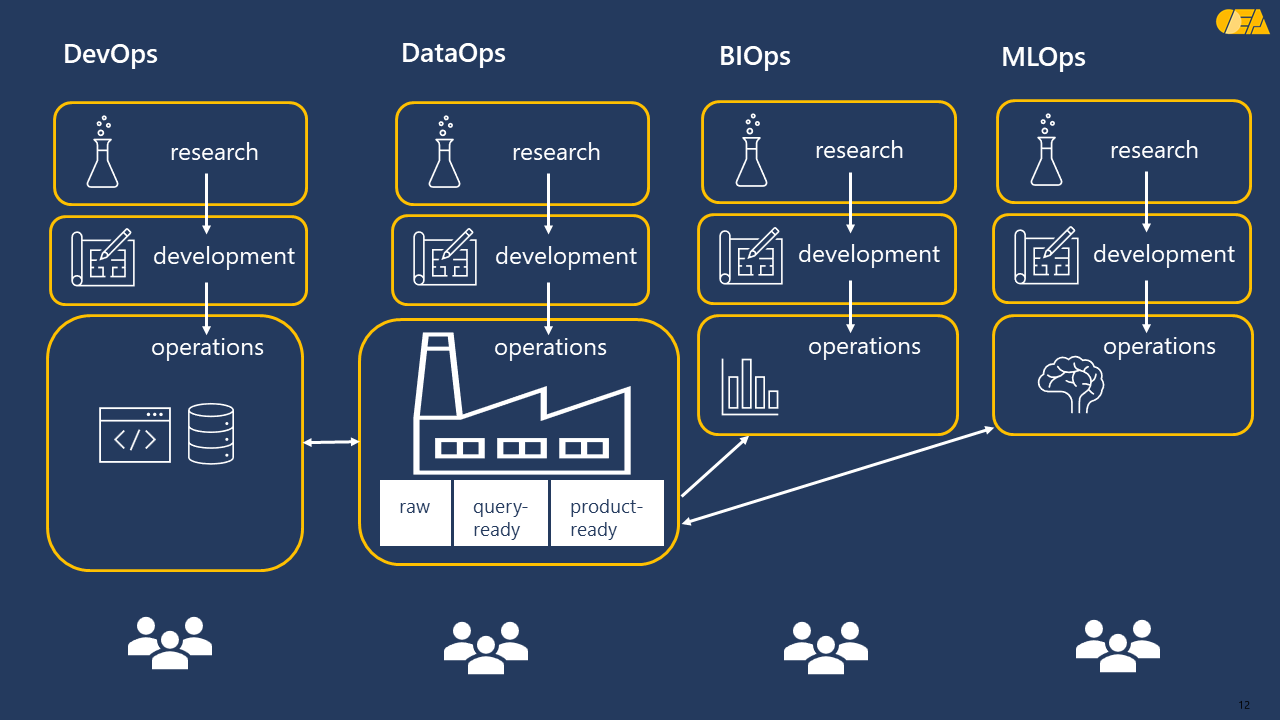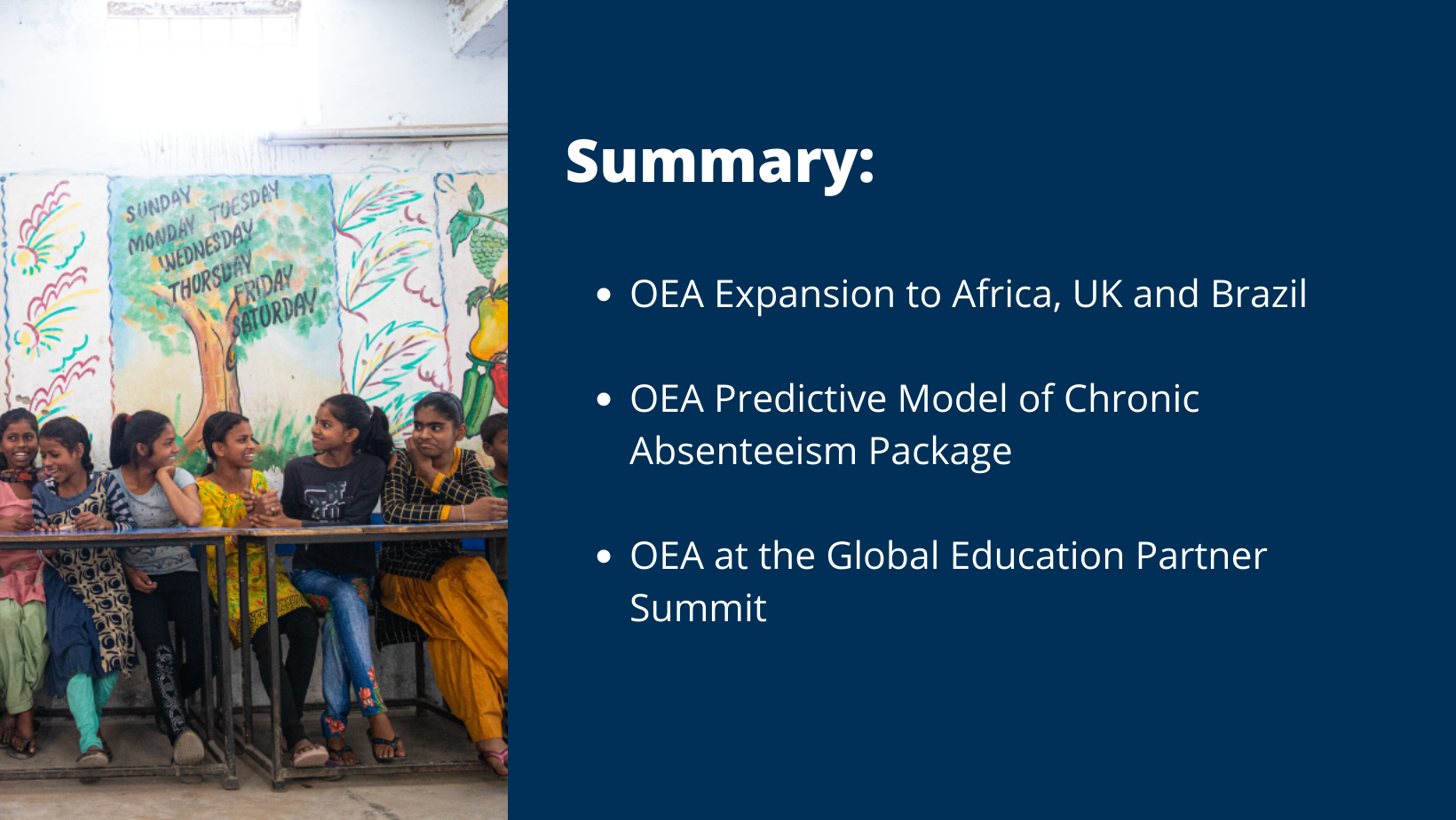-
OEA Overview
Open Education Analytics (OEA) is a community of education systems and tech partners, coordinated by Microsoft Education, collaborating to develop open source data analytics solutions for the education sector built on Azure Synapse Analytics and PowerBI.
- OEA Website: https://openeducationanalytics.org
- OEA GitHub Repository: https://github.com/OpenEducationAnalytics/OpenEduAnalytics
- OEA Overview Video: OEA Overview on YouTube
OEA Partners
We are excited to kick off a new partner training program in Africa this quarter! OEA is partnering with the African Institute of Mathematical Sciences (AIMS) , a pan-African network of centers of excellence enabling Africa’s talented students to become data innovators driving the continent’s scientific, educational and economic self-sufficiency. For phase one of this project, we will be training their IT staff, faculty and Master’s students using the OEA curriculum, to enable them to do OEA deployments, data engineering and analytics. Concurrently, we will be exploring use cases for Ministries of Education in Africa.
The Microsoft Global Education Partners Summit was held virtually on April 26-28 and provided an opportunity for our Microsoft Education partners to gain insights into Microsoft’s Education Business. The OEA team organized a roundtable discussion on data and AI with OEA Advanced Partner companies Analytikus, Community Brands, Spyglass, Antares, and MOQDigital. The roundtable introduced education data and analytics use cases to the partners and recruited new OEA Partners. Our session at GEPS was popular – having over 80 interested partners attending.
Our quarterly OEA Partner meetings were held on April 12 (EMEA) and May 3 (APAC) for partner companies already in the program, where we discussed use case examples, provided tech roadmap and training information, and shared new GitHub contributions.
OEA Community Spotlight
For our US OEA committee session in April, we hosted a presentation by Dr. Zhongzhou Chen of the University of Central Florida, who shared his experience applying Learning Analytics as Associate Professor of Physics, teaching intro-level courses to over 250 students. Dr. Chen opened discussion on key principles related to Instructional Design and Designing for Analysis and presented on the use of student learning data to measure student learning strategy. He demonstrated a compelling example of how his team unveiled distinct differences in outcomes and success based on the learning strategies of the students.
With a team of developers from the University’s Center for Distributed Learning, they developed an open-source platform to implement a new instructional design called mastery-based online learning modules. His team also developed analysis techniques and visualization scheme of student interactions and identified clusters of students with different learning strategies helping with implementing data driven actions. In the future, they would like to explore having this new instructional design implemented on a cloud platform that will enable multiple groups of instructors and learning engineers as creators to devise their own solution at a significantly lower cost. They would want to push the outcomes to learning management systems leveraging Azure and Power BI to significantly reduce the cost of the entire process.
Through the OEA US Channel, we share these session resources and related materials pertaining to Learning Analytics, with participation of Community members from institutions like University of Southern California, University of Florida, Bill and Melinda Gates Foundation, University of South Australia, and Northeastern University, and more.
Data Analytics and AI
OEA officially published a new open-source package to support education systems in developing predictive models of Chronic Absenteeism. Working with Fresno Unified School District and Kwantum Analytics, the package includes Use Case Documentation that combines prior research and the application of principles of responsible AI to the project, data pipelines, data visualization concepts, and the tools to deploy this type of predictive model. Other education systems and partners are welcome to use these technical assets to address challenges of absenteeism in their schools.
We have published Microsoft’s School Transformation Survey (STS) as an OEA module , where STS data can be ingested into an OEA Azure data lake and used in analytics as part of education use cases to help schools begin their education transformation and to measure their progress. The School Transformation Survey is a free, self-hosted survey that measures the perceptions of educators and leaders on the current state of innovative teaching practices in their schools or classrooms. It is a self-review and serves as an important first step in raising awareness of each school’s current state of transformation.
Data Engineering
In the Global OEA Community call in April, OEA Architect, Gene Garcia presented a wide-ranging discussion of modern data engineering technologies and innovations that engaged the community in a deeper technical discussion. This is based on work directly with the Georgia Department of Education’s statewide data modernization effort.
As we continue to refine and extend the OEA reference architecture, we have recently begun formulating guidance regarding best practices from a process point of view. In the software development world, the set of practices referred to as DevOps has enabled development teams to greatly increase their productivity by shortening the development lifecycle through agile processes and automation practices including CI/CD (continuous integration/continuous deployment) leading to an ever-increasing set of advanced features in Azure DevOps as well as GitHub and other developer tools, focused on facilitating best practices for DevOps. This has also led to the refinement of similar development lifecycle processes including DataOps and MLOps .
As part of the ever-growing OEA community discussions and goals, we’re learning more about how our customers and partners approach the DataOps and MLOps challenges, both from a process standpoint as well as tooling approach. From these discussions and direct development engagements we are building out the process guidance as well as the ticket backlog templates and CI/CD pipelines that can be shared with the community along with the other OEA assets.

Figure 1: OEA Lifecycles
Field and Communities
In April, the OEA team and community members from the Council of Chief School Officers, Bill and Melinda Gates Foundation, and Fresno Unified School District were invited to a panel at the ASU-GSV Summit in San Diego. The topic for the panel discussion was Modernizing Education Systems’ Data and AI Strategies: A Global Education Data Open-Source Initiative and was the second most attended Microsoft session at the Summit! We talked about how we are accelerating education systems’ shift to modern data services, enabling real time analytics, and co-developing AI use cases for education. During this session, participants heard from district, state, higher education, and national leaders about how they are collaborating through OEA to develop new state and national education analytics, build more accurate predictive models, enable competency-based and digital equity reporting, and analyze tech and other program investments in real time. [Watch the recording]
Our OEA Partners, Community Brands and LeXP, are launching 2 new regional OEA Communities in the UK and Brazil. In the UK, the Community’s focus will be with multi-academy trusts, whereas the OEA Brazil Community will start with higher education institutions.
During the last Australia OEA Community call, Rohan Kumar, CVP of Data and AI, Azure gave an overview of the data and AI product announcements in May.
Plans for June/July
- Expansion to Africa: training sessions for the African Institute of Mathematical Sciences and use case exploration for Ministries of Education in Africa
- Publishing of Canvas module and Digital Equity package
- Global OEA community call in June

